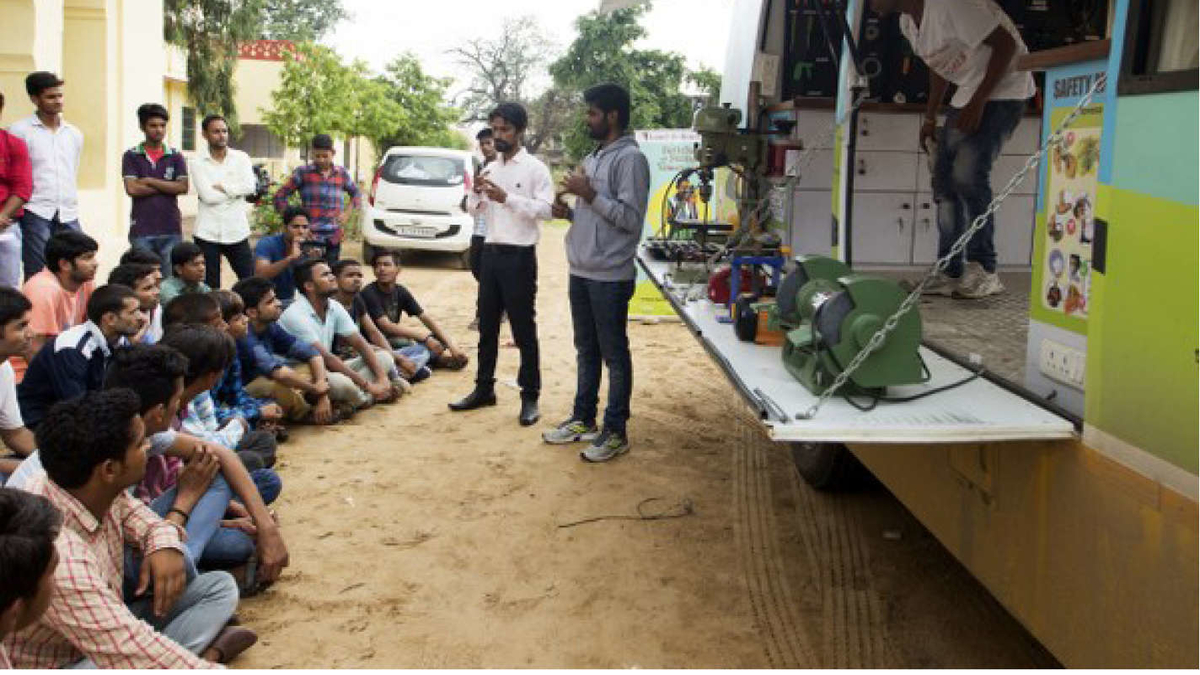


I was on an official visit to Pune as Secretary, School Education, Government of India during 2017. Raj Gilda, co-founder of Lend A Hand India had been after me for a while to visit one of the schools run by the organization to impart vocational education to high school students. Despite wanting to, I had not been able to squeeze time out of hectic schedule. When he got to know about my visit to Pune, he once again approached me. Impressed by his perseverance and persistence, I decided to visit the school on the way to the airport as I was returning to Delhi. What I saw was an amazing demonstration of dedicated work.
Journey of Lend A Hand India (LAHI) began when the co-founders, Sunanda Mane and Raj Gilda visited Vigyan Ashram, an NGO running 1 year full time residential skill development program for rural youth in 1995. Ten years later, while they had settled in New York, they thought of ‘giving back’ and work for the cause of education back in India. They believed that real life vocational education could naturally complement existing educational curriculum and provide students with a more hands on experience. In partnership with Vigyan Ashram, they launched the multi skill vocational education program in 100 secondary schools with the consent of Maharashtra Government. The program was evaluated by Tata Trust in 2011 and demonstrated significant impact. This led Sunanda and Raj to quit their full time jobs in New York with UN and Citibank respectively and focus full time on LAHI.
The flagship program supported by LAHI, “Multi Skill Foundation Course” complements the existing secondary school curriculum of Grade 9 and 10 with skill education to help the students learn better. It provides students with practical focused hands-on experience in skills such as health and hygiene, food processing, gardening, electrical wiring, woodwork etc. Without any gender bias, boys learn cooking and girls learn electrical wiring. Students curiously undertake minor installations such as electric bell, repair of a bench, growing vegetables and selling in market, or helping at home to change fuse wire or fix a mixer. The course is now a 100 marks subject with the state board exam and certification.
As LAHI was exploring scaling up strategies in 2013, they were introduced to Suvarna Kharat, Joint Secretary, Government of Maharashtra, who was then heading the state for scheme of “Vocationalisation of School Education” by Central Ministry of Education. With support from dynamic Secretary of Education, Ashwini Bhide who was later succeeded by another efficient IAS officer, Nandkumar and the guidance from an extremely supportive Joint Secretary, Ministry of Education, Radha Chauhan, LAHI began its journey of forming strong partnership with State Governments to implement and scale up vocational education in the State. Qualified staff was identified, trained and paid by LAHI. It worked side by side with the State Department of Education with strong focus on policy execution. LAHI team members were co-located and work with the government officials to prepare a long-term strategic roadmap, annual plans, and execute the policy. LAHI also set up demonstration model in government schools to showcase model school and the best practices. It is an ideal example of three-way, public-private partnership, where the nonprofit delivers technical and domain expertise, funded by philanthropic capital, and backed by policy making power of the State Governments. To retain the independence and avoid conflict of interest, the support is provided at no financial cost to the Government. LAHI’s partnership with the state of Maharashtra set an ideal example of how three pillars of our society (private, civil society and the government) can come together to achieve greater good.
Emergence of LAHI’s State partnership model coincided with regional workshops by the Central Government where many innovative models of public-private partnerships were showcased. With the support the Central Government, LAHI replicated the Maharashtra model in 24 states/UTs across India covering 10,000+ schools and 1 million plus students each year.
LAHI also partnered with the State of Maharashtra to get National Skills Qualification Framework (NSQF) compliance for “Multi Skill Foundation Course”. It also secured support from G P Upadhyay, a visionary IAS officer in the State of Sikkim. Many other states also joined in this path-breaking achievement wherein an innovative grassroots program was recognized by a National Body. Subsequent to recognition as NSQF Compliant, the Multi Skill Foundation Course is currently offered in 10 states.
Another important focus area, identified by LAHI’s decade long experience is ‘internships’ – hands on experience in real life situation. Starting 2017, LAHI has been focusing on ‘internship’ for Grade 11/12 students with small and micro enterprises in Pune during summer/winter vacation in partnership with Pune Municipal Corporation. Internship has now become part of the national policy. The initial results of the internship program have been extremely encouraging e.g. 76% employers were willing to hire the students who had completed internships, 82% of the parents say that they would have no problems in allowing their daughters to pursue a non-traditional careers, 90% students felt that internship helped them develop employability skills, and 88% students felt that it helped them make informed career choices.
Ultimately, LAHI hopes to remove the age old misconception about vocational education that it is for economically weaker class, or only for those who are not good in studies. A strong believer in Gandhiji’s philosophy of “Buniyaadi Shala” and “Nayi Taalim”, LAHI hopes to restore dignity of labor by introducing the young minds to “learning by doing”.
It has launched a program to revive three Buniyaadi Schools in West Champaran District in Bihar started by Gandhiji as a homage to him during the 150th birth anniversary year.
LAHI has demonstrated that despite challenging set of circumstances, appropriate and meaningful vocational training can be imparted. They made it happen. NEP2020 has placed huge emphasis on vocational education with the aim to introduce vocational education in 50% of the schools by 2025. LAHI can contribute to bring this policy objective to reality in the years to come.